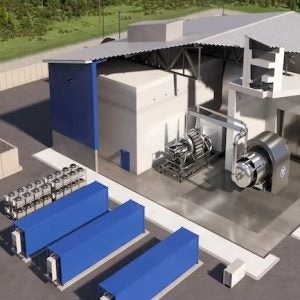An official ceremony on 26 March has marked the end of the construction phase at Barakah 1 in the United Arab Emirates (UAE), but no operation date has been confirmed.
Barakah is the UAE’s first nuclear plant and South Korea's first nuclear reactor export project. The inauguration event was attended by South Korean President Moon Jae-in and Crown Prince of Abu Dhabi Sheikh Mohamed bin Zayed Al Nahyan.
The 1400MW APR-1400 reactor Barakah 1 officially started construction in July 2012 and was built by Korea Electric Power Corporation (Kepco). Cold hydrostatic testing, structural integrity testing, integrated leak rate testing, and pre-operational hot functional testing have already been completed at Barakah 1. However, the next phases of pre-operational tests require nuclear fuel to be loaded into the reactor once the UAE Federal Authority for Nuclear Regulation (FANR) has granted an operating licence.
The plant operator Nawah Energy Company; a joint venture between Emirates Nuclear Energy Corporation (Enec) and South Korea’s Kepco has not announced an anticipated date for fuel loading.
Barakah 1 was originally expected to start operation in 2017. However, according to recent reports FANR has deferred the operation of the reactor until 2019 due to concerns about the expertise of the staff, Reuters reported 22 March.
“The planning has slipped, and the schedule is tight… they have told people it will be 2019,” one source told Reuters.
Another source told Reuters that the 1800 personnel lack adequate nuclear training and experience. “This country had no nuclear culture before, and it now has to develop an entire nuclear economy around the reactor project. That takes time,” the source said.
Enec in February appointed Peter Dietrich, an executive from US utility Southern California Edison, as its chief nuclear officer. He will be responsible for leadership programmes to support the next generation of Emirati nuclear professionals required to operate the Barakah plant.
The four reactors under construction at Barakah are due to come online by 2020. The plant is expected to supply up to a quarter of the UAE's electricity and save up to 12 million tonnes of carbon emissions a year, once fully operational.






